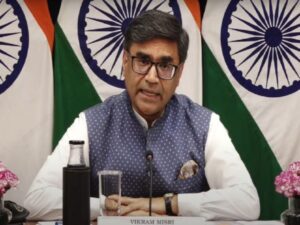US Defence Secy, Blinken urge joint passage of Israel, Ukraine funding; cite national security threat
Washington, DC [US], November 2 (ANI): US Secretary of State Antony Blinken and Defence Secretary Lloyd Austin have called on lawmakers to swiftly approve the Biden administration’s USD 105 billion national security funding request, highlighting the connection between the conflicts in Israel and Ukraine. They argue that failing to pass aid for both nations together would embolden US adversaries worldwide, CNN reported.
They made their case during a Senate Appropriations Committee hearing as the Middle East crisis intensifies, with the humanitarian situation in Gaza deteriorating and civilian casualties mounting due to expanded Israeli operations.
Blinken, Austin, and several lawmakers highlighted the ties between the Middle East and Ukraine conflicts, emphasising Iran’s role in arming Russia.
“Allowing Russia to prevail with Iran’s support will embolden both Moscow and Tehran,” said Blinken.
“To put it succinctly, for our adversaries, be they states or non-states, this is all one fight and we have to respond in a way that recognises that. If we start to peel off pieces of this package, they’ll see that, they’ll understand that we are playing whack-a-mole while they cooperate increasingly and pose an ever-greater threat to our security as well as to that of allies and partners,” he added.
“In both Israel and Ukraine, democracies are fighting ruthless foes who are out to annihilate them,” Austin said, adding, “We will not let Hamas or Putin win. Today’s battles against aggression and terrorism will define global security for years to come. And only firm American leadership can ensure that tyrants, thugs, and terrorists worldwide are not emboldened to commit more aggression and more atrocities.”
While advocating for the passage of the comprehensive aid package, which includes over USD 14 billion in additional military assistance for Israel, Blinken and Austin reiterated their support for Israel’s military response while stressing the expectation that Israel adheres to international laws of war, according to CNN.
The funding request comprises USD 61.4 billion in aid for Ukraine, USD 14.3 billion in aid for Israel, USD 9.15 billion in humanitarian aid, USD 7.4 billion for Taiwan and the Indo-Pacific region, and USD 13.6 billion for US-Mexico border security.
In the Senate, leaders from both parties have called for any funding related to Israel to be combined with Ukraine and border security funding.
However, some House Republicans, led by Speaker Mike Johnson, have unveiled a separate USD 14.3 billion Israel funding bill, which includes USD 14.3 billion in cuts to the Internal Revenue Service and no funding for Ukraine.
Blinken’s opening statements at the hearing faced interruptions from protesters demanding an immediate ceasefire.
Blinken acknowledged the protests, saying, ” I…hear very much the passions expressed in this room and outside this room. All of us are committed to the protection of civilian life. All of us know the suffering that is taking place as we speak. All of us are determined to see it end.”
“But all of us know the imperative of standing up with our allies and partners when they’re security, when their democracies are threatened. That’s what’s happening now. We stand resolutely with them even as we stand resolutely for the protection of innocent civilians,” he said.
Austin emphasised the lessons learned from US counterterrorism operations that could be applied to Israel’s actions against Hamas, cautioning that actions, if not taken with care, “create a resistance to your effort that lasts for generations.”
The package includes over USD 9 billion in humanitarian aid for Ukraine, Israel, Gaza, and other humanitarian needs.
Blinken argued, “Humanitarian assistance is also vital to Israel’s security. Providing immediate aid and protection for Palestinian civilians in the conflict is a necessary foundation for finding partners in Gaza who have a different vision for the future than Hamas – and who are willing to help make it real.”
“Food, water, medicine, and other essential humanitarian assistance for civilians must be able to flow into Gaza. Civilians must be able to stay out of harm’s way – a task made even more difficult as Hamas uses civilians as human shields. And humanitarian pauses must be considered,” Blinken reiterated.
Aid to Gaza civilians has been limited, with around 60 trucks entering daily through the Rafah crossing from Egypt, compared to 500 to 800 trucks daily before the conflict, as reported by CNN.
Blinken acknowledged the possibility of some aid spillage but noted that the majority of the assistance has reached those in need, emphasising the need for more assistance.
“To date, we don’t have reports either from the UN or from Israel that this assistance has been diverted from its intended recipients but it’s something that we’re going to track very closely,” Blinken said.
“Can I promise you in this committee that there’ll be 100 per cent delivery to the designated recipients? No. There will inevitably be some spillage. We haven’t seen it to date, but I think we have to anticipate that,” he continued.
“But the overwhelming, overwhelming majority of the assistance thus far is getting to people who need it, and we need more,” Blinken said, CNN reported.






